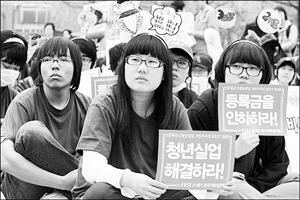
High tuition is one burden university students have to shoulder. No matter how many protests students have held to tackle tuition increases, schools have consistently raised tuition. Student grievances toward universities have thus grown. And the supplementary budget announced by the ruling Grand National Party (GNP) has again caused tuition fee fever.
On March 24, the GNP announced a plan for a supplementary budget amounting 28.9 trillion won to overcome the current economic downturn
In the supplementary budget, the government designated about 200 billion won to offset high tuition fees. The money will be used to increase the amount of scholarships and to cut the maximum student loan rate for tuitions under the name of “college tuition payment” as a comprehensive emergency relief package for low-income earners.
However, the plan has provoked anger among congressmen from minority parties and from students. Moreover, minority parties say only 90 thousand of the nation’s three million students would benefit from government-planned scholarships.
After the government’s announcement on March 24, eight congressmen on the Education, Science & Technology Committee held a press conference to demand that money be used to help the students most affected by rising tuition. On April 24, they again met with the press in the National Assembly building to ask the ruling party to keep President Lee Myung-bak’s campaign pledge from the 2008 presidential race to halve university tuition fees.
On the same day, the Yonsei University Student Association released a statement about tuition fees. The statement lamented students’ financial hardships and asked whether the amount meant to reduce tuition could be expanded.
“Before meeting some congressmen, we had a press conference to urge the ruling party to create direct and practical policies to address high tuition fees,” said Park Joon-hong (Yonsei University, 4), the current president of the student association.
The final version of the revised supplementary budget, which provided 28.4 trillion won, passed the National Assembly on April 30 with an increase of about 80 billion won to lower tuition fees.
But students who believe the small increase is not a fundamental solution have organized against the policy.
Handaeryon (Korean initials for “Korean university students association”), an association of 70 university student associations, held protest rallies across the nation on May 1 and 2 to demand government efforts to reduce tuition.
“Ten million won for tuition fees is certainly a burden for both students and parents. The most appropriate action the government can take is to reduce it. I think it is possible to make ‘half tuition fees’ true as long as there is the government’s will to achieve,” said Lee Won-ki (Pusan National University, 4), the president of Handaeryon as well as president of the Pusan National University’s student association.

